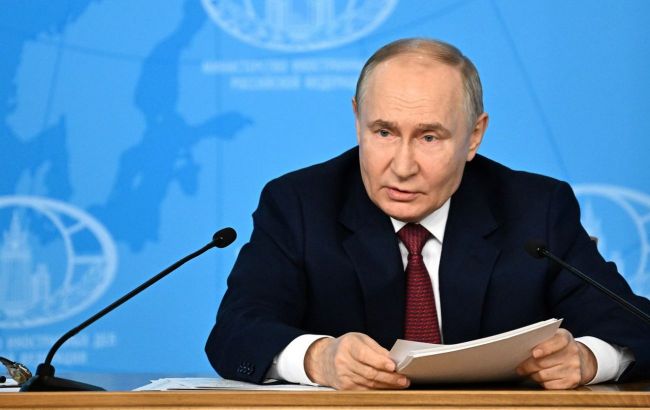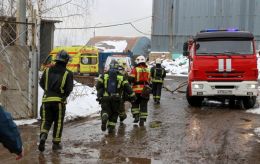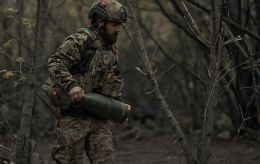Russia exhausted? Hidden motives behind Putin's new ultimatums and why they are unacceptable to Ukraine
 Photo: Vladimir Putin issues an ultimatum to Ukraine before the Peace Summit (kremlin.ru)
Photo: Vladimir Putin issues an ultimatum to Ukraine before the Peace Summit (kremlin.ru)
On the eve of the Global Peace Summit in Switzerland, Russian President Vladimir Putin outlined the conditions under which he would supposedly be ready for peace talks with Ukraine. This led to comparisons with Adolf Hitler in 1938, as Putin demanded the cession of four regions.
Read about why these new ultimatums are detached from reality and what Putin's true objectives are in the material by RBC-Ukraine.
Contents
- Putin's ultimatum
- Reactions in Ukraine and the West
- Why Putin's claims on four regions are detached from reality
- War freeze or Ukrainian surrender: what Putin wants
- Will Putin succeed in intimidating the West
Putin's ultimatum
Today, Putin announced that he made "another real peace proposal" and warned that if it is rejected, the situation on the battlefield will change unfavorably for Ukraine, making future conditions for peace talks different. There are two key conditions:
Withdrawal of Ukrainian troops from the territories of Donetsk, Luhansk, Zaporizhzhia, and Kherson regions. Putin specified that he meant the territories within their administrative borders and would subsequently demand their recognition as subjects of the Russian Federation.
Ukraine's abandonment of its course to join NATO.
"As soon as Kyiv declares readiness for such a decision and begins the real withdrawal of troops from these regions, and also officially announces the abandonment of plans to join NATO, on our part, an order to cease fire and begin negotiations will be issued immediately, literally at that very moment," stated Putin.
Additional conditions for "peaceful settlement" include a neutral, non-aligned, and non-nuclear status for Ukraine, demilitarization, so-called denazification, and ensuring the rights of Russian-speaking citizens.
Furthermore, the proposal includes the cancellation of all Western sanctions against Russia.
"The essence of our proposal is not about some temporary truce or ceasefire... It's not about freezing the conflict, but about its final resolution," Putin added.
Reactions in Ukraine and the West
In response to Putin's speech, Mykhailo Podolyak, an advisor to the head of the Office of the President of Ukraine, commented on the situation. He stated that the "standard aggressor's set" clearly indicates Putin's inability to adequately assess the realities.
According to him, the Russian proposal looks like this:
- "Give us your territories.
- Give up your sovereignty and your subjectivity.
- Leave yourselves unprotected (no membership in alliances).
- Lift (together with Western countries) all sanctions in full and immediately
- Let's urgently fix the "not/failure of Russia" at the expense of Ukraine
Of course, there is no novelty in this, no real peace proposals and no desire to end the war. But there is a desire not to pay for this war and to continue it in new formats. It's all a complete sham," said Podolyak.
Ukraine's Ministry of Foreign Affairs called Putin's statements manipulative.
"By throwing such signals into the information space on the eve of the inaugural Global Peace Summit in Switzerland, Putin pursues only one goal: to prevent leaders and countries from participating in this summit. The fact that Putin's statements appeared just one day before the summit is evidence that Russia is afraid of true peace," the Ministry of Foreign Affairs said in a statement.
On the sidelines of the G7 summit, President Volodymyr Zelenskyy said that Putin would not stop even if his ultimatums were fulfilled. He also drew a parallel with Nazi dictator Adolf Hitler before the outbreak of World War II.
"This is the same thing Hitler did when he said: 'Give me a part of Czechoslovakia, and that will be the end of it'. But no, this is a lie – a historical lie. After that, there was Poland, then the occupation of the whole of Europe," Zelenskyy said.
NATO Secretary General Jens Stoltenberg said that it is not Ukraine that should withdraw its troops, but Russia.
"So this is not a peace proposal. This is a proposal of more aggression and more occupation. And it demonstrates in a way that Russia aims to control Ukraine and that has been the purpose of Russia since the beginning of this war. And that's a blatant violation of international law and that's also the reason why NATO Allies continue to support Ukraine," he said.
US Secretary of Defense Lloyd Austin emphasized that Putin had no right to impose peace conditions on Ukraine. He added that the allies should step up military aid as the war has entered a key stage.
Why Putin's claims on four regions are detached from reality
Putin's demand to withdraw Ukrainian troops from four regions encompasses territory larger than North Macedonia, Slovenia, or Israel, notes analyst Julian Röpke of BILD. According to him, the Russian army is far from fully occupying Donetsk, Luhansk, Zaporizhzhia, and Kherson regions at present. At the current pace, achieving this would take decades. Therefore, Putin's words are seen more as desperation than a serious proposal.
Oleksandr Musiienko, head of the Center for Military-Legal Research, describes Putin's recent speech as "purely Russian bravado," not grounded in battlefield realities.
"Is Russia capable of capturing two large regional centers Kherson and Zaporizhzhia by military means? I am sure that it cannot and will not. By the way, the offensive in the Kharkiv region has demonstrated this. No matter how hard they try to encircle Kharkiv, they will fail," he said.
Military-political observer Oleksandr Kovalenko from the Information Resistance group points out that the Russian military machine is nearly exhausted.
Despite attempts to display strength for opening new fronts, their actual combat readiness is reduced, comparable to the force deployed in Belarus during the 2022 Kyiv offensive.
"The difference is that back then they moved through Chernihiv and part of the Kyiv region, whereas now they stopped in the small town of Vovchansk and that's it. But they need to show that there's still potential and they should be negotiated with," explains the expert.
War freeze or Ukrainian surrender: what Putin wants
Kovalenko is convinced that Putin's statements should be taken as an attempt to put the war on hold on his own terms.
"It is about freezing the conflict... They want a pause. No wonder they started negotiating with African and Latin American countries to buy back Russian and Soviet equipment because there is nothing to fight with," he said.
He also drew attention to the fact that Russia had recently sent a diplomatic mission to Sudan to negotiate the purchase of Soviet tanks.
"The Russian mechanized component is exhausted and needs a pause. That's why Putin has been making calls for peace since his visit to China. But there can be no peace from the Russians. Only when they cannot start a new war," the expert said.
According to political scientist Volodymyr Fesenko, Putin's ultimatums, on the contrary, indicate that he does not want a freeze. He sets conditions for surrender, which does not guarantee Ukraine any peace. It is about fulfilling the conditions before negotiations even begin.
The clause on the withdrawal of Ukrainian troops is a response to the Ukrainian peace formula. As for demilitarization, this is a reference to the Russian draft of the Istanbul agreements, which contained a fourfold reduction in the Armed Forces of Ukraine.
"These are absolutely unacceptable demands for us. Of course, no one intends to fulfill them, and the West will have a corresponding attitude. But Putin is raising the stakes," explains Fesenko.
This is done to divert attention from the Global Peace Summit in Switzerland, as well as to signal the countries of the Global South and China, which are trying to promote alternative peace plans. But the previous demands in the plans of Brazil and China are also unacceptable.
"Real peace talks will begin when neither side imposes any preconditions. What Putin is demanding is absolutely unacceptable for Ukraine. Today he wants four regions that he does not fully control. And tomorrow he will want Kharkiv, Odesa, and Kyiv, it is simply inevitable," he said.
Putin is also trying to divert attention from the news about security guarantees for Ukraine from the United States and Japan. He is demonstrating that he will not compromise, but will demand Ukraine's surrender, which does not suit either our country or our partners. Therefore, there will be no positive response to Putin's whims, the political scientist added.
Will Putin succeed in intimidating the West
Oleksandr Musiienko points to a number of positive developments. These include security agreements with new partners, announcements of air defense systems, aid from Britain and Germany, and more. And the Swiss summit will discuss the Ukrainian peace plan, not any other.
"Plus tough sanctions against the Moscow Stock Exchange. Against this backdrop, Putin is using a manipulative technique: he seems to have no influence, Russia is capable of achieving military victories, but he gives a chance to retreat and negotiate. He is hoping that the West will believe that everything is fine and that it may be better to talk now than under worse conditions later," the expert explains.
It should be noted that according to the Western press, one of the goals of the Global Peace Summit is to find a way to engage Moscow in real peace talks. Today, Putin has made his position clear. Therefore, the scenario of future negotiations looks unlikely.
According to Musiienko, there is little reason to worry that the partners will start to persuade Ukraine to meet with Russia "somewhere in the middle."
"On the contrary, this should make them support Ukraine even more. I can't imagine them saying: 'Leave Kherson and Zaporizhzhia'. I don't think we should count on any position in support of Russia. Although Putin hopes for it and hopes to intimidate the West," he said.
Oleksandr Kovalenko emphasizes that what Putin says has nothing to do with the peace formula that Ukraine talks about and that should unite civilized countries tomorrow.
"For us, the main thing is to put an end to this war. And it will be put when Russia is completely exhausted. When it has no opportunity to fight. When it is dealing with internal problems. Then we will return our 1991 borders, we don't need anything else," he summarized.
Sources: statements by Vladimir Putin, Ukrainian President Volodymyr Zelenskyy, advisor to the head of the Presidential Office Mykhailo Podolyak, NATO Secretary General Jens Stoltenberg, Pentagon Secretary Lloyd Austin, comments by political scientist Volodymyr Fesenko, head of the Center for Military and Legal Studies Oleksandr Musiienko, and columnist of the Information Resistance group Oleksandr Kovalenko.

